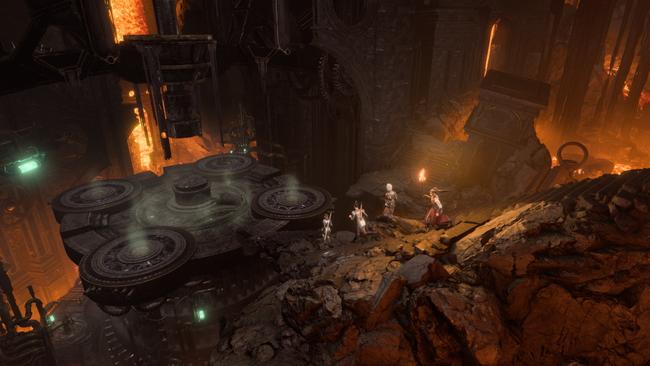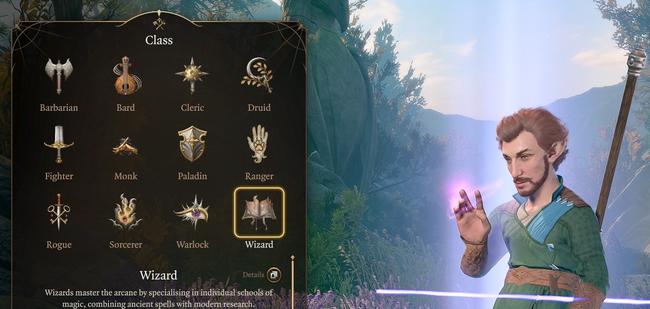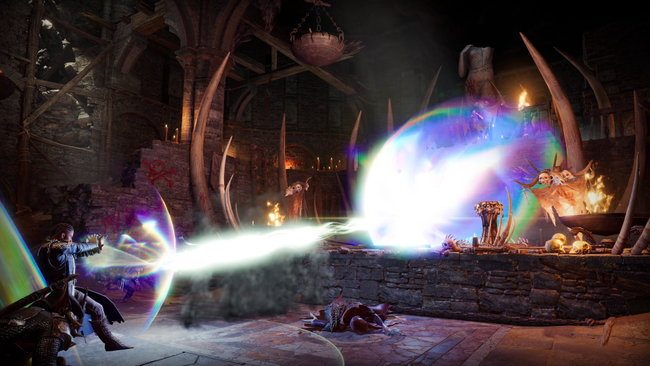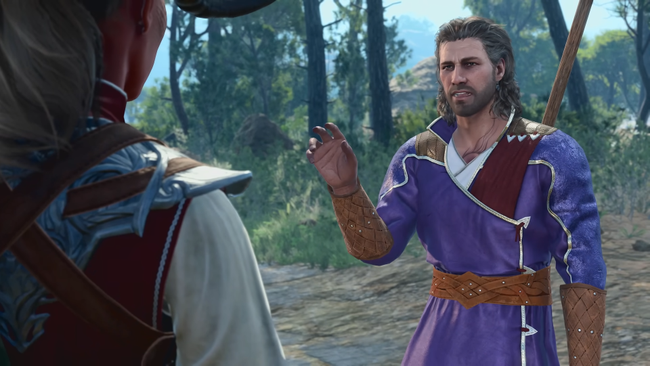
Baldur's Gate 3 Wizard Class Guide - The best schools of magic, multiclass options, and spells
If you were to change a game's title to something more literally representing what that game is about, you could well get away with renaming Dungeons & Dragons to Wizards and Warriors, for the split between magic-casting and weapon-swinging classes forms the foundation of the game's mechanics. And just so in Baldur's Gate 3, Wizards are the bedrock of the game's approach to magic. Every other class that uses magic is, fundamentally, a twist or turn from how a Wizard does it. This class guide aims to help you understand the Wizard class in Baldur's Gate 3, as well as the many choices that get you from being a mere hedge mage to the next Elminster.
For other classes and aspects of the game, see our full slate of available Baldur's Gate 3 guides.
Before You Begin
Note that none of these points are set in stone. Build your character the way you choose, and see these notes more as suggestions than rules. For more tips, check out our Baldur's Gate 3 Character Creation guide.
This guide will also assume that you are building a custom character. Origin Characters have unique interactions and roleplaying options available thanks to their preset nature. Gale, a former Chosen of Mystra, is a Wizard Origin Character. Choose him as your protagonist if you'd like to play as an Origin Wizard.
Additionally, this guide presumes you are building a single-class character. Multiclassing into different classes as you level up is an option to gain new and useful abilities, but there’s also value in specialization. We’ll have a few multiclass suggestions for you at the end of the guide.

The Wizard Playstyle
Wizards are the epitome of the "squishy" caster. Unlike Warlocks, Bards, Druids, Clerics, and even Sorcerers, Wizards are the most heavily specialized in casting magic and not terribly good at much else. But they do it better than almost everyone else. This means you'll want to stay in the back line of any engagement, screened by more durable party members, while you whip out the perfect spell to resolve a situation.
Wizards have the most spell slots and the widest spell selection of all the classes and thus have the most leeway to devote spell slots to exotic or specialized magic. Wizards are the most likely to have a spell that will perfectly target a foe's weakest saving throw, which can ensure that can make the most out of every spell you cast.
Wizards are most often used in the roles of crowd control or dealing ranged damage, but honestly, the Wizard's only limit is the size of their spellbook and the number of spell slots available. With the right spell, you can do pretty much anything, up to and including tanking, healing, and scouting. Whether it's easy or ideal to do so, of course, is another matter. But you can, sort of. Wizards are a class that rewards mastery of Baldur's Gate 3's complex magic system.

Wizard Class Features
- Key Abilities: Intelligence and Wisdom
- It's all about the smarts! Intelligence is the primary spellcasting attribute for Wizards, and determines how many spells they can learn at creation. Boost it as high as possible.
- A bit of Constitution will improve a Wizard's concentration checks and shore up their paltry HP pool.
- Some Dexterity can add to a Wizard's armor class when wearing no armor or Light Armor.
- Wizards also use Wisdom and Intelligence for their saves
- Gear Proficiency: Dagger, Quarterstaff, Light Crossbow
- Skill Proficiency: At creation, Wizards can choose 2 skills for their proficiency. Arcana, Insight, and Investigation will synergize with the Wizard's natural abilities.
- Arcana
- History
- Insight
- Investigation
- Medicine
- Religion
- Arcane Recovery: Wizards can quite literally live and die based on whether they have enough spell slots to spare. This feature allows a Wizard to spend charges of Arcane Recovery to replenish spent spell slots. Higher-level slots require more charges, with Level 5 spells being the maximum.
- Schools of Magic: Every spell in the game is associated with a specific "School" of magic like Transmutation, Evocation, or Illusion. The school of magic describes a spell's qualities. In Baldur's Gate 3, Wizards can specialize in a specific school as their subclass choice. See the Subclasses section for more details.
- Choosing a school to specialize in also reduces the cost of transcribing a new spell to the Wizard's spellbook. Spells of a Wizard's chosen school can be learned for half the regular cost.
- Wizards also gain minor bonuses when using spells of their school, and special tricks associated with the school. For example, Illusionists can see Invisible enemies.
Wizard Gear Recommendations
- As the squishiest class by far, Wizards gain no native proficiency with armor and very few weapon proficiencies. You can wear armor if you get it from a racial bonus or multiclass choice, and this is recommended, particularly for the early game.
- That said, there are plenty of robes and wizard hats in the game that have particularly useful magical effects that can be quite appealing to a working Wizard. Don't be shy about ditching the armor if a bit of clothing's effects are good enough for it.
- If a Wizard has to resort to their weapon to defend themselves, something's gone wrong. Take a dagger or staff, but if a weapon you don't have proficiency in has a good magical bonus, feel free to equip it. Actually using the weapons is for the martial classes, after all.

Wizard Subclasses
Selected at Level 2, Wizards choose to specialize in a given school of magic, becoming a caster of that class and gaining special features and benefits when interacting with magic from that school. The other schools of magic are, however, still open to them, so ultimately, the effects of a Wizard's subclass choice don't fundamentally change their playstyle. When choosing your school of magic, review the different features and see if the benefits align with how you want to play your Wizard.
As a rule of thumb, some of the most commonly used combat spells are found in the Evocation, Abjuration, and Conjuration schools. Transmutation, Enchantment, and Necromancy also have a number of powerful spells in their selection, while Illusion has several broadly useful tools for use inside and outside combat.
Abjuration
Abjuration magic deals with wards, banishes extraplanar enemies, and nullifies magical effects. Many defensive spells are based in Abjuration and Abjurers gain the ability to passively form an Arcane Ward that blocks damage. Examples of Abjuration spells include Blade Ward, Protection from Evil and Good, Banish, Remove Curse, and Globe of Invulnerability.
Subclass Features
- Abjuration Savant: Abjuration spells cost half as much gold to learn from scrolls.
- Arcane Ward: A passive ward that forms from the residual magic of your Abjuration spells. The Ward has a "charge level" that increases based on the levels of cast Abjuration spells (i.e. casting a Level 2 spell adds 2 charges). The Ward blocks incoming damage equal to the present charge level, then reduces its charge by 1.
- Projected Ward: Abjurers can "sacrifice" their active Arcane Ward to reduce the damage taken by nearby allies.
- Improved Abjuration: Upon a short rest, the Arcane Ward charges by an amount equal to your wizard level.
Conjuration
Conjuration deals with summoning, and Conjurers can bring creatures and objects to them from other planes, or displace them in space. Conjurers are experts at maintaining the dimensional connections required to manipulate conjured summons and are particularly adept at teleportation.
Subclass Features
- Conjuration Savant: Conjuration spells cost half as much gold to learn from scrolls.
- Minor Conjuration: Create Water: Once per short rest, Conjurers can call forth a bit of rain to extinguish exposed flames and create a water surface. A good way to douse a burning area or prepare a trap.
- Benign Transposition: Teleport: Once per long rest, Conjurers can teleport a short distance or swap places with an ally. A good way to gain some distance if caught in close range to an enemy.
- Focused Conjuration: Taking damage while concentrating on a Conjuration spell no longer causes a concentration save. Helpful if you come under attack while maintaining a summon or other spell.
Divination
Divination magic involves prediction and information gathering. Diviners can look into and shape time itself, using future sight to determine outcomes. Examples of Divination spells include True Strike and Detect Thoughts.
Subclass Features
- Divination Savant: Divination spells cost half as much gold to learn from scrolls.
- Portent: After a long rest, Diviners gain two randomized "Portent Dice". These dice can be spent as a reaction to overwrite the dice roll of any Attack Roll or Saving Throw rolled near the Diviner. The Portent Dice expire at the end of the day or when used.
- Expert Divination: An enhancement to Portent. You gain a third Portent Die, and when taking a short rest with spent Portent Dice gives you a "prophecy", a mini-objective that can be fulfilled to immediately replenish your spent Portent Dice. These effects can be things like doing a certain type of damage or using a particular action.
- Third Eye: Once per long rest, you can open your third eye, gaining Darkvision out to 24m and being able to see invisible enemies if they fail a dexterity save against you.
Enchantment
The school of magic concerned with the mind and wills of people and monsters both, Enchantment spells can beguile, bewitch, and affect the disposition of those around you. Enchanters can command powerful control spells that often have utility outside combat. They can incapacitate a creature with their very gaze, and are so adept with spells of the school that they can multiply their effects across multiple targets. Examples of Enchantment spells include Friends, Charm Person, Tasha's Hideous Laughter, Sleep, and Hold Person.
Subclass Features
- Enchantment Savant: Enchantment spells cost half as much gold to learn from scrolls.
- Hypnotic Gaze: Charm and incapacitate a creature in melee, keeping it from acting or attacking you if it fails a wisdom save. You can maintain this gaze each turn, but it ends when the creature takes damage.
- Instinctive Charm: Can charm a creature attacking you, causing it to attack a new target (if possible) as a reaction.
- Split Enchantment: Single target enchantment spells can now target 2 creatures.
Evocation
Evocation spells deal with shaping and focusing raw elemental energy. Much of the game's attack magic is Evocation-based, and Evokers are its masters. Evokers can cause their evocation spells to avoid damaging allies (similar to the Sorcerer's Careful Spell Metamagic, but exclusive to evocation spells), as well as amp up their evocations' ability to pierce enemy defenses and damage.
Subclass Features
- Evocation Savant: Evocation spells cost half as much gold to learn from scrolls.
- Sculpt Spells: When in the area of effect of your evocation spells, allies automatically succeed saving throws and take no damage from them. Read: No friendly fire from your Fireballs.
- Potent Cantrip: Enemies take half damage from your cantrips even if they succeed at a saving throw (they will still dodge secondary effects, though).
- Empowered Evocation: Add your Intelligence modifier to damage rolls with evocation spells.
Illusion
The school of illusion concerns itself with magic that affects the senses and tricks the mind, making the impossible seem real. Illusionists can cast an improved version of Minor Illusion (one of the most effective stealth/distraction spells in Baldur's Gate 3), can see invisible creatures, and can cause incoming attacks to miss by forcing them to hit an illusory duplicate instead. Examples of Illusion spells include Minor Illusion, Disguise Self, Invisibility, Seeming, and Phantasmal Killer.
Subclass Features
- Illusion Savant: Illusion spells cost half as much gold to learn from scrolls.
- Improved Minor Illusion: You can now cast the Minor Illusion cantrip as a bonus action. It can also be cast while hidden or silenced. Minor Illusion is a powerful cantrip because it causes nearby creatures to investigate, turning their attention away from you or setting them up for an ambush.
- See Invisibility: Illusionists become able to see Invisible creatures once per long rest at a range of 9m against the creature's dexterity save. This is similar to the Divination feature.
- Illusory Self: Once per short or long rest, you can create an illusory duplicate of yourself when a creature makes an attack roll against you. This duplicate intercepts the incoming attack as a reaction and causes it to miss, then dissipates.
Necromancy
Exploring the cosmic forces of life, death, and decay, Necromancy manipulates the energy inside all living things, transferring or even sapping it for power. Necromancers can harvest power from the deaths they cause, and receive improved undead thralls when using the Animate Dead spell. At higher levels, they can resist the debilitating effects of necrotic energy. Examples of Necromancy spells include Ray of Sickness, Bone Chill, Animate Dead, Vampiric Touch, and Eyebite.
Subclass Features
- Necromancy Savant: Necromancy spells cost half as much gold to learn from scrolls.
- Grim Harvest: Once per turn, killing a living creature (does not apply to undead and constructs) with a spell causes you to regain HP equal to double the level of the spell slot used. This effect is increased to triple if a necromancy spell was used to make the kill.
- Undead Thralls: You automatically learn the Animate Dead spell if you don't know it already, and can raise an additional corpse when casting Animate Dead. The raised corpses also have additional HP equal to your wizard level, and deal additional damage based on your proficiency bonus. Additionally, Animate Dead can be cast without needing preparation.
- Inured to Undeath: You become resistant to necrotic damage, and your maximum HP cannot be reduced
Transmutation
Transmutation spells modify energy and matter itself, turning one thing into another. Transmuters are particularly adept at the art of alchemy, deriving improved results from alchemical recipes. They can also create special temporary items that grant passive benefits to party members. At high levels, they can even transmute themselves or others into other forms for a short period.
Subclass Features
- Transmutation Savant: Transmutation spells cost half as much gold to learn from scrolls.
- Experimental Alchemy: Get two alchemical solutions instead of one when mixing extracts by succeeding a Medicine skill check (DC 15).
- Transmuter's Stone: When you cast a transmutation spell of Level 1 or higher or once per long rest, you can create a Transmuter's Stone, a temporary item that gives a benefit to the creature carrying it. The stone dissolves after a long rest. The benefits conveyed to the stone's carrier are passive and can be very useful, especially since they can be stacked with ritual spells and other buffs.
- Darkvision
- Movement Speed increase
- Elemental Resistance
- Proficiency in Constitution Saves
- Shapechange: Can change yourself or a target in melee range into a blue jay bird for 5 turns. The blue jay can fly, if it is "killed", it reverts to its original form with the HP it had before being changed. Requires a concentration roll to maintain.

Wizard Level Progression
These are the class features you’ll get as you level up as a Wizard. The maximum level cap in Baldur’s Gate 3 at launch is Level 12. Use this to see what you’ll get at each level and plan accordingly, in case you wish to multiclass.
This guide will also highlight class features you gain based on your subclass choice. For more detailed info about the subclasses, see the sections above. Features gained by a Subclass are labeled with the Subclass name.
Note: Unlabeled benefits are “standard” class features and common to all subclasses.
Level 1
- HP: 6 HP + Constitution Modifier, gaining minimum of 4 HP + Con modifier per level.
- Gear Proficiency: Dagger, Quarterstaff, Light Crossbow
- Skill Proficiencies: Choose 2 skills from Arcana, Insight, Investigation, Medicine, Religion, History.
- Wizard Spells:
- 3 cantrips known
- Intelligence Modifier + 1 spells known
- 2 Level 1 Spell Slots
- Arcane Recovery
Level 2
- Wizard Spells:
- +1 Level 1 Spell Slots (3 total)
- School of Magic: Choose a school of magic as your subclass
- Abjuration: Abjuration Savant, Arcane Ward
- Conjuration: Conjuration Savant, Minor Conjuration: Create Water
- Divination: Divination Savant, Portent
- Enchantment: Enchantment Savant, Hypnotic Gaze
- Evocation: Evocation Savant, Sculpt Spells
- Illusion: Illusion Savant, Improved Minor Illusion
- Necromancy: Necromancy Savant, Grim Harvest
- Transmutation: Transmutation Savant, Experimental Alchemy
Level 3
- Wizard Spells:
- +1 Level 1 Spell Slots (4 total)
- 2 Level 2 Spell Slots
Level 4
- Feat Selection: Can pick a Feat from All Classes Feat list. While any class at level 4 can pick many of the Feats, not all will be relevant to the class. You can also choose an ability improvement to boost a bonus or eliminate a penalty. Check out our full Feats guide for more advice on Wizard-appropriate Feats.
- Recommended Wizard Feats:
- Ability Improvement
- Alert
- Durable
- Elemental Adept
- Lucky
- Mobile
- Ritual Caster
- Resilient
- Spell Sniper
- Tough
- War Caster
- Recommended Wizard Feats:
- Wizard Spells:
- +1 Cantrips known (4 total)
- +1 Level 1 Spell Slots (4 total)
- +1 Level 2 Spell Slots (3 total)
Level 5
- Wizard Spells:
- 2 Level 3 Spell Slots
Level 6
- Wizard Spells:
- +1 Level 3 Spell Slots (3 total)
- School of Magic Subclass Feature:
- Abjuration: Projected Ward: Can sacrifice active Arcane Ward to shield allies.
- Conjuration: Benign Transposition: Teleport: Can teleport to an unoccupied space nearby or swap positions with an ally.
- Divination: Expert Divination: Can recharge spent Portent Dice by accomplishing mini-objectives.
- Enchantment: Instinctive Charm: Can reflexively charm attackers.
- Evocation: Potent Cantrip: Cantrips can deal half damage even when the target saves successfully.
- Illusion: See Invisibility: Can detect invisible creatures.
- Necromancy: Undead Thralls: Can cast Animate Dead without preparation, get more and better undead from casting Animate Dead.
- Transmutation: Transmuter's Stone: Can create a temporary item that confers passive buffs to its holder.
Level 7
- Wizard Spells:
- 1 Level 4 Spell Slot
Level 8
- Wizard Spells:
- +1 Level 4 Spell Slots (2 total)
- Feat Selection: Can pick a Feat from All Classes Feat list
Level 9
- Wizard Spells:
- +1 Level 4 Spell Slots (3 total
- 1 Level 5 Spell Slot
Level 10
- Wizard Spells:
- +1 Level 5 Spell Slots (2 total)
- School of Magic Subclass Feature:
- Abjuration: Improved Abjuration: Arcane Ward now charges up equal to your Wizard level after a long rest.
- Conjuration: Focused Conjuration: Conjurations no longer subject to concentration checks from taking damage.
- Divination: Third Eye: Can temporarily acquire Darkvision and the ability to see Invisible creatures.
- Enchantment: Split Enchantment: Enchantments that normally target 1 creature can now target 2 creatures.
- Evocation: Empowered Evocation: Add your Int modifier to damage rolls with any evocation spells.
- Illusion: Illusory Self: Can cause an incoming attack to miss by intercepting it with an illusory duplicate.
- Necromancy: Inured to Undeath: Gain resistance to necrotic damage, immune to maximum HP drain.
- Transmutation: Shapechanger: Can change yourself or a target into a blue jay bird temporarily.
Level 11
- Wizard Spells:
- 1 Level 6 Spell Slot
Level 12
- Feat Selection: Can pick a Feat from All Classes Feat list

Multiclass Wizards
As for more typical multiclass options:
Sorcerers are a potential utility option for Wizards looking to multiclass. Two levels of Sorcerer will unlock metamagic and sorcery points, the key feature of a Sorcerer and a powerful set of adjustments to spell properties. A third level will unlock more potent metamagic powers.
Warlocks can be a strong option for Wizards with high charisma that are seeking some consistent power that's not dependent on their prepared spell slots. Eldritch Blast and pact magic will recharge on a short rest, making the warlock's limited options work as a good fallback when the Wizard doesn't quite have the right spell ready.
Rogues are an excellent utility multiclass option for Wizards, because Rogues often love to have a high intelligence and dexterity, two stats Wizards often invest in on their own. Rogues add a number of useful skill proficiencies, and give access to light armor and sneak attacks, for the occasional ambush. Three levels of Rogue gives the wizard the Cunning Action feature and allows the Wizard to become an Arcane Trickster. While there's a significant amount of overlap between the Arcane Trickster and Wizard's spellcasting, the improved version of Mage Hand Arcane Tricksters can command can make a Wizard take over for a more dedicated rogue role in the party.
If a Wizard is tired of being squishy and wants to go nuts, Fighter is a good option. Picking up martial weapons and armor proficiency can make a Wizard much less of a liability in physical combat. Three more levels unlocks Action Surge and allows the Wizard to become an Eldritch Knight, a class that can use a melee weapon decently enough.
Wizards that want to keep the faith in their robes and Wizard hats might choose the Monk for additional survivability. Monks often fight unarmored, and the Wizard can benefit from the Monk's unarmored defense perk, provided they have high Wisdom. Monks also improve a Wizard's melee ability with their martial arts.